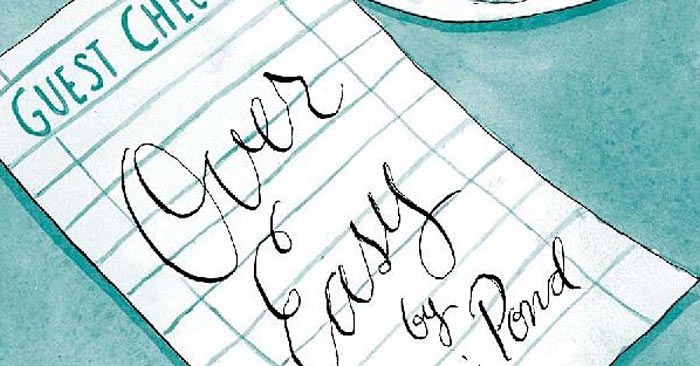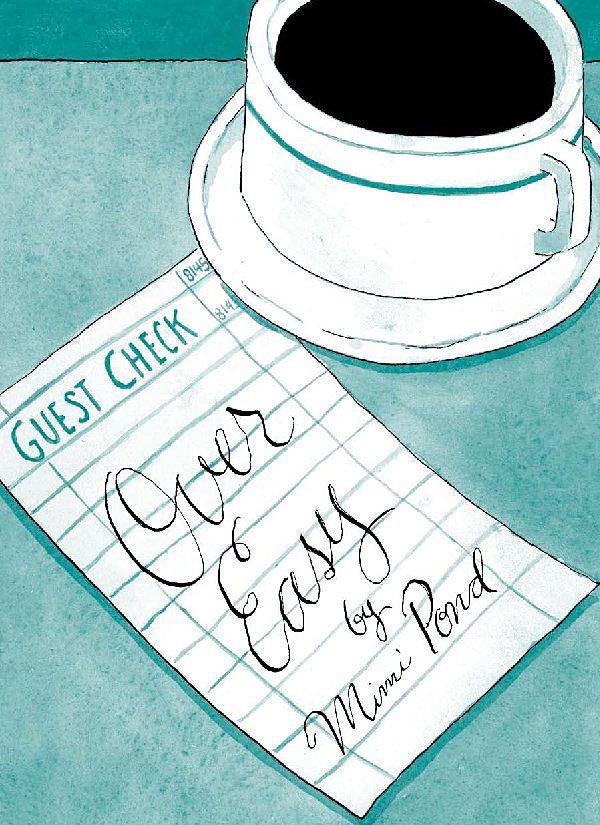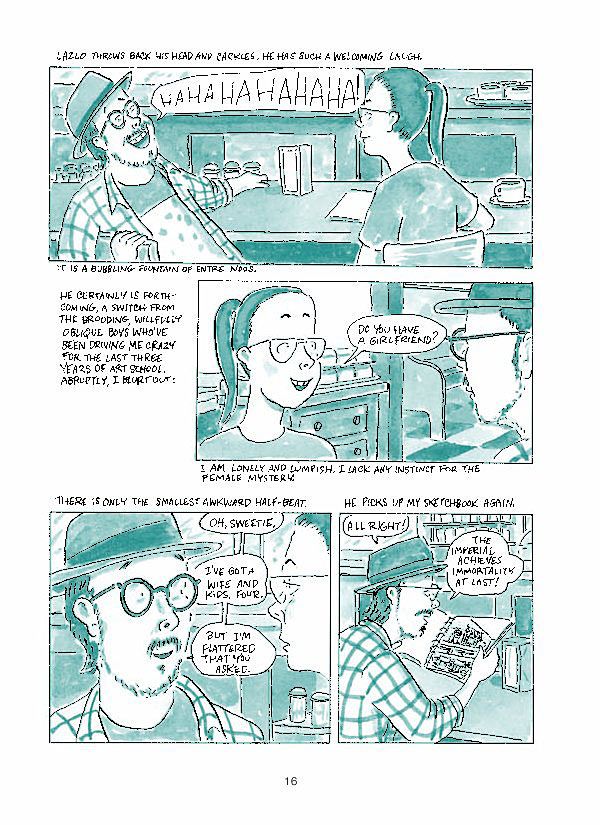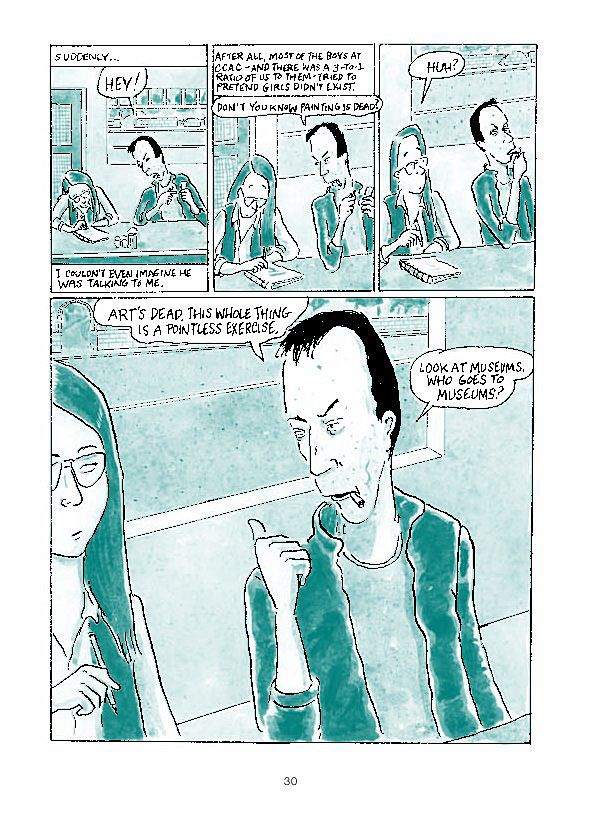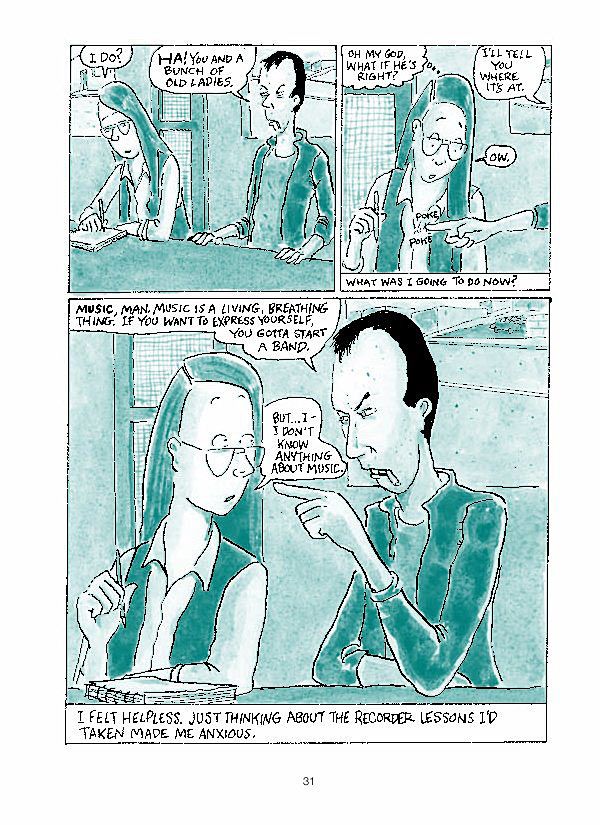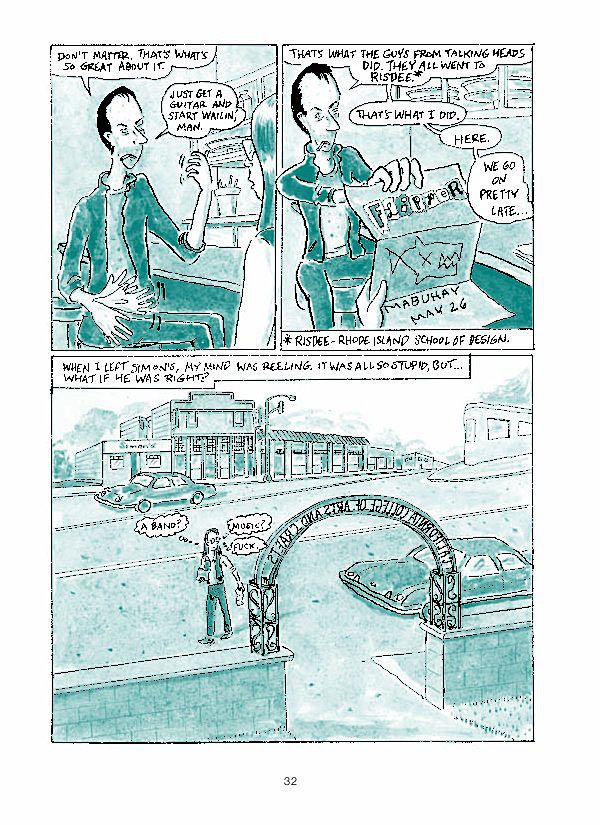Mimi Pond carried the 1970s around with her for a long time.
At the end of the "Me" decade, the longtime cartoonist and TV writer went from art school to waitressing at a left of center diner in Oakland, California. As the optimism of the '60s died its slow death, Pond met a cast of ex-hippies, future punkers, sardonic waitresses, weirdo line cooks, charmers, dealers and more. The staff of the restaurant provided a unique support system for the young artist and, as the years past, an effective window into the decade.
For the next several decades, Pond hoped to turn her time in the restaurant into a story, eventually drafting a prose manuscript 15 years ago, which finally became a fully realized project this year. Told in a mostly autobiographical graphic novel, "Over Easy" from Drawn & Quarterly explores both the personal journey of Pond's alter ego Madge and the changing times represented in the diner's group of outsider employees and patrons. CBR News spoke to Pond about the book ahead of her appearance as a Special Guest at this year's Comic-Con International in San Diego.
CBR News: Mimi, you've said in a number of interviews that when you originally worked in the diner that served as the basis for "Over Easy," you knew there was a story there that had to be told. What was it about that place that inspired something in you so immediately? The atmosphere? The people?
Mimi Pond: It was just that the experience of working there and the people working there and the place itself was almost like a character. It just reached right down my throat and grabbed me. I don't know. It just compelled me. Everything about it was fascinating.
Early in the book, you found the restaurant because at the time you'd been going around sketching diners. Back then did you continue to draw the place as you worked there over the years?
No. It was a full-time job, so you can't draw and waitress. [Laughs] The spirit of the place got a hold of me, but it wasn't like I started working on this right away. It just stayed in the back of my mind. The real-life version of Lazlo -- my boss in the story -- was a man named John Veglia who called himself Nestor Marzipan. He and I talked many times about the fact that we thought this should be a story. We kicked around ideas that never quite pulled together at the time. I started working there in 1978, and I left in 1982 and went to New York. He and I continued to correspond, and he'd tell me about all the latest gossip in the restaurant and the drama of everything. I kept these letters because they were so beautifully written and funny. They were nothing you'd ever want to throw away. So we continued to discuss the idea of what the story was, but we could never quite put our fingers on it. Then he died in 1988, and after my first child was born in 1992, I really started to think about it some more, and it began to gel in my mind. It was at that point after my children were born that I began taking more notes and eventually outlines and lists of characters and scenarios. I slowly put it together over the course of about 15 years.
Do you think it was just that you needed that time in order to find what this story was?
Yes, I absolutely think I did in terms of thinking about my younger self as opposed to my adult self -- the adult who had children and responsibilities everything. That plays into the story tremendously. You have this guy who's like our groovy beatnik dad who's out carousing with a bunch of 20-somethings when he has a wife and kids at home. That was the lightbulb that went off in my head after my son was born. It was, "Wait. Don't you want to be home with your family?" [Laughs] "Shouldn't that be a thing you should be doing?" And this is someone who was universally adored and worshipped. He had this crazy talent for making everyone feel like they were the most important person in the room and validating your feelings and your observations about things in a really special way. But in some ways, I just think he wasn't able to be there for his family. In his own way, I think he was a good dad and cared about his children tremendously, but I think he was kind of living at a remove from his own life. That was the thing I finally realized that made his character so much more complex.
While Lazlo is a force of nature in the book, this is really your story. The book opens with an overview of your life up to that point and while it eventually opens up to include everyone in the diner, you come back in a very strong way in the second half. And what stood out to me reading it was that the voice of the story that existed in the captions was both something that sounded like a person reflecting on their younger self but also often felt genuinely in the moment of that younger person's life. I know you started this out as a prose memoir before turning it to comics. Was that writing process part of what developed the voice you had in the final comic?
Yeah, I think so. That in itself took four or five years to hash out -- just the writing part. I went back and edited that and really cut it down. Then drawing it, I had to hone it further because if I included every single sentence from the manuscript it'd be 2,000 pages long. Also, some things are just better seen than said. So the drawing helped with that.
And I'm still very close to the people that worked there and to the owner of the restaurant. The restaurant is still there, and in fact my son wound up going to California College of the Arts -- which used to be the California College of Arts & Crafts which was my school. He just graduated, and even when he was small I made many trips up there for research. I took a lot of pictures and a lot of notes. We had a scrapbook that was kept by one of the people who worked there. So someone had the foresight to take a bunch of pictures way back when, and he allowed me to borrow that and scan a lot of the photos. So those were a great resource for me when doing this as well.
And I heard your son also worked at the diner?
Yeah, he worked there temporarily as a part-time dish washer. Although it's nothing like what it was. I mean, it was the '70s. [Laughs]
So what was his response to the book?
He liked it. He liked it a lot. You know -- both he and his sister had a lot of questions. [Laughs] What can I say? It was just a different time.
In so many ways, this book is really about that era and the maddening elements of the cultural in the '70s. How big a part of the long gestation of this book was you figuring out what exactly to say about that time?
Well, I always had my beef with the '70s and I wanted to rant about it. My kids see it as this romantic past with disco and everything and thinking, "Gosh, that must have been fun." But it was actually a very confusing decade. The '60s were really tumultuous if you were a child growing up then. JFK was assassinated, and that was really traumatic. Then you had the Beatles, which was really exciting. Then hippies come along, and they're anywhere from five to 15 years older than you are. So you say, "I want to be a hippie. That seems really exciting. Woodstock!" But then the '70s got really cranked up after the Manson murders, Watergate, the oil crises, Jonestown and Patty Hearst. Everything from the '60s kind of curdled, and it got really weird. There was no one to tell you what was what. The '60s had upended all the rules. Up was down. Bad was good. Drugs were good. Sex was good. It was up to you to figure out how to pick your way through this moral swamp. It's not like it is now where you've got these helicopter parents monitoring their kids constantly. No one was really paying much attention, and the kids were just kind of sliding around in the flattened out back of the station wagon while the parents were filling up the car with cigarette smoke. [Laughs] Shit got weird, and all that mellow crap -- I was so over that. I was really glad when punk rock came along because it was at least something exciting and new.
The scene where the young hippie burns all his peacenik paintings and shaves his head to become a punker is particularly memorable in that respect.
That really did happen. Also, Ted Falconi from the band Flipper did corner me in the coffee shop across from school. That was utterly verbatim. I couldn't make that up. I think this is universally true for all times, but for young people there's always someone slightly older who's there to boss you around or tell you that you just missed the coolest part of the party. "It's all over, and you really should have been here five minutes ago because that's when it was all happening."
From a working perspective, you've done short comics for years, and you've also written a number of longer pieces, but this is your first full-on graphic novel. What was the aspect of doing a work like this that you weren't expecting going into it?
When I was making the decision about what things in the manuscript get to go into the book, there are sentences that will say to you, "I want to be a full page" and instead you're like, "Fuck you. You get to be a panel." [Laughs] You're constantly trying to figure out what has to be a single panel and what gets to stretch out. How to balance the pace of the storytelling with the images is a challenge, then making sure that it all tracks and flows in a visual form. But I've lived with it for so long in my head that I can see it all, so it's not so much harder to figure all that out. It's just a lot of drawing!
One of the key scenes later in the book is someone kind of challenging you to move to New York in that classic "It'll chew you up and spit you out" way. Do you take the second volume farther out into your life?
No, it takes me to the end of working at the restaurant. It all comes from the same manuscript, and it's the same process. I'm doing it chapter by chapter, so I'll do pencil roughs and then finished linework. I have to do the color work and the separations later on a lightbox. I try and keep that process for every chapter. Right now I'm working on the third chapter of six more chapters for the second book.
Overall, what's it been like to get this story out after thinking on it for so long? What's the response been like from the others who lived it?
The response has been extremely gratifying. It really felt like I'd been working on this under a rock for so long. Especially before the artwork was separated, it wasn't like I could show them what it was going to look like. So I've been so isolated working on it, it was a tremendous amount of relief when I found out that people were actually enjoying it and really feeling like it did capture the essence of the time and the place - especially from the people I worked with. Probably the most gratifying part was finding out that they felt I'd really captured the way that place was.
"Over Easy" is on sale now from Drawn & Quarterly. Pond will appear as a Special Guest of Comic-Con International in San Diego.

